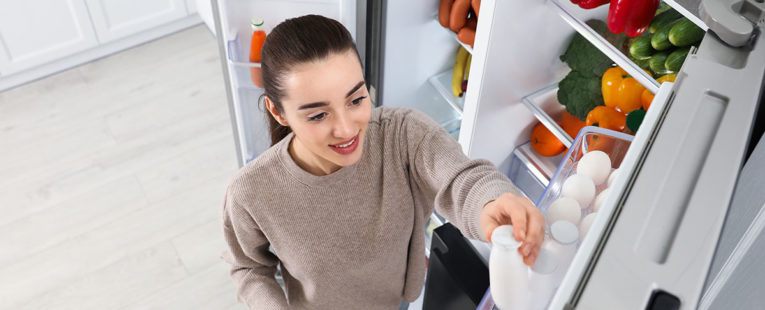Since the novel coronavirus (COVID-19) pandemic reached our communities, most of us have taken to stocking up on larger-than-normal amounts of supplies to limit trips to the store. However, the act of stocking up can create an unintended health hazard.
You might be tempted to stuff as much food into your refrigerator as it can hold; to take advantage of every square inch of space. But, having too much food in your fridge actually causes it to not work properly, putting yourself in danger of getting sick from improperly cooled food, according to Nathan Hamman, wellness services manager at OSF HealthCare Saint Anthony Medical Center in Rockford, Illinois.
“If your refrigerator is overloaded there won’t be proper air flow, so the temperature could be raised too high,” Hamman said. “If you don’t have a thermometer, either in your refrigerator or one with a digital display, you don’t know how warm the food is, and it needs to be kept at 40 degrees Fahrenheit or colder so bacteria and mold and those types of things don’t grow on the food.”
The “Danger Zone”
According to the U.S. Department of Agriculture, bacteria grows fastest on food between the temperatures of 40 degrees Fahrenheit and 140 degrees Fahrenheit. This temperature range is known as the “Danger Zone.” So, to protect yourself and your family from foodborne illness, you need to keep the following in mind:
- Hot food needs to be kept at 140 degrees Fahrenheit or above while it is being served or sitting out. If you are going to store it, then it needs to be chilled, which brings us to the next point.
- Cold food needs to be kept at 40 degrees Fahrenheit or below at all times.
More food safety

Leftovers should be tossed out after four days, Hamman said, and anything left sitting out on a counter for a while should be tossed, too. If a food item has developed a peculiar odor, that’s a good sign it belongs in the trash.
“You don’t want to reheat things multiple times, so if you’re taking leftovers out, only take out the portion you’re going to cook, because if you keep heating it up and cooling down and heating it up and cooling down, you’re more likely to have food borne illnesses,” Hamman said. “If it’s been out for more than two hours, it’s best to just throw it away rather than put it in the refrigerator.”
Other helpful tips
- Check the expiration date on your food.
- Checking for any discoloration and wash fruits and vegetables that may be dirty or contain pesticides.
- Wash your hands before cooking or handling food. “Always wash your hands before you start cooking and when you switch from one type of food or another,” Hamman said. “Especially if you’re using raw meats, you don’t want to cut those and then the produce. Make sure you use different knives and different cutting boards and clean up after yourself so you don’t touch contaminated surfaces.”
Last Updated: January 15, 2021
